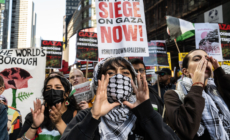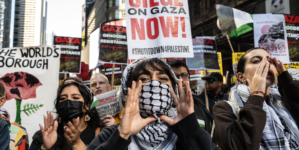-
U.S. Open: JJ Spaun Posts Stunning Career First for Lead at Oakmont - 17 mins ago
-
Flights Grounded at Boston’s Logan Airport After JetBlue Plane Rolls Off Runway - 37 mins ago
-
Woman Films What Rescue Dog Does on First Night Home—Then Makes Realization - 52 mins ago
-
Russian Scientist Released After Four Months in Federal Custody - about 1 hour ago
-
American Sympathy for Israel Reaches ‘All-Time Low’ in New Poll - about 1 hour ago
-
Immigration raids spark fear, rage across L.A. as police quell agitators - 2 hours ago
-
Most Women Can Spot ‘Toxic Masculinity’ After This Many Dates - 2 hours ago
-
Trump Blocks California E.V. Rules in Latest Move to Rein In the State - 2 hours ago
-
Unexpected Solution Could Help Reduce Sudden Infant Death Syndrome - 3 hours ago
-
Harvey Weinstein Retrial: Judge Declares Mistrial on Final Sex Crime Charge - 3 hours ago
Iran Threatens Israel’s Nuclear Sites as Trump Blocks Strike Plan
Iran has threatened to strike Israel’s nuclear facilities if attacked, claiming it has gathered extensive intelligence on them. The warning comes as U.S. President Donald Trump told Israeli Prime Minister Benjamin Netanyahu in a 40-minute call that a military strike on Iran “must be taken off the table for now,” according to Israeli state media.
The exchange highlights widening tensions between the U.S. and Israel, with Netanyahu pushing for a tougher stance while Trump presses for diplomacy—even as he acknowledged Iran’s “much more aggressive” behavior.
Newsweek has reached out to the State Department as well as the foreign ministries of Iran and Israel for comment.
Why It Matters
Iran’s warning signals a heightened risk of regional conflict involving nuclear infrastructure. For the U.S., which is engaged in delicate nuclear talks with Tehran, the threat complicates its effort to balance deterrence with diplomacy. Israel’s concern over Iranian intentions—driven by Tehran’s expanding nuclear activity—puts added pressure on the Trump administration’s strategy.
As Iran moves to leverage intelligence gathered on Israeli facilities, and the U.S. refrains from endorsing military escalation, the situation threatens to widen the gulf between allies and embolden hardliners in both countries.

Majid Saeedi/Getty Images
What To Know
Iran’s Supreme National Security Council said that Iranian intelligence services had obtained “a vast quantity of strategic and sensitive information and documents” related to Israel’s nuclear infrastructure. The council claimed this intelligence had completed an “operational cycle” enabling Iran’s armed forces to target Israeli nuclear sites in response to any Israeli strike on Iranian nuclear facilities.
The council warned that “any act of evil against [Iran’s] economic and military infrastructure” would result in a “precise and proportionate response.”
Diplomacy With Tehran
On Tuesday, during a call with Netanyahu, Trump emphasized his preference for diplomacy, saying the U.S. had submitted a “reasonable proposal” to Iran and was expecting a response soon. He noted that Iran had become more aggressive in recent negotiations, but talks were ongoing.
Netanyahu countered by calling the negotiations futile, accusing Iran of playing for time and urging that a “credible military threat” remain on the table. Trump rejected this stance, insisting that a military strike on Iran “must be taken off the table for now.” When Netanyahu sought clarity on whether the U.S. would approve Israeli action if necessary, Trump did not provide a definitive answer. The conversation ended without any breakthrough on Israel’s demands, according to Israel’s Channel 12 and public broadcaster Kan.

Anna Moneymaker/Getty Images
Talks Progress
Meanwhile, U.S. State Department spokeswoman Tammy Bruce said the talks with Iran were making some progress despite recent setbacks. She emphasized that negotiations are dynamic, adding that “it would appear that things are moving forward,” though not dramatically. She confirmed that another round of talks is expected soon.
What People Are Saying
Iran’s Supreme National Security Council: “These sites would be attacked in response to any Israeli strike on Iran’s nuclear infrastructure.”
U.S. State Department spokeswoman Tammy Bruce: “It is a dynamic, as it would be with any diplomatic consideration, that negotiations are meant to move things forward and the good news is, is that, in fact, it would appear that things are moving forward, and that’s what we all want.”
What Happens Next
Iran is expected to respond to a new U.S. proposal at an upcoming sixth round of nuclear talks, with the location still unconfirmed after earlier sessions in Oman and Italy. Despite mediation efforts, Washington and Tehran remain divided over uranium enrichment—Trump demanding a full halt, while Iran insists on its right to peaceful nuclear energy. With tensions rising and a counterproposal pending from Tehran, the gap between diplomacy and confrontation appears increasingly difficult to bridge.
Source link




















